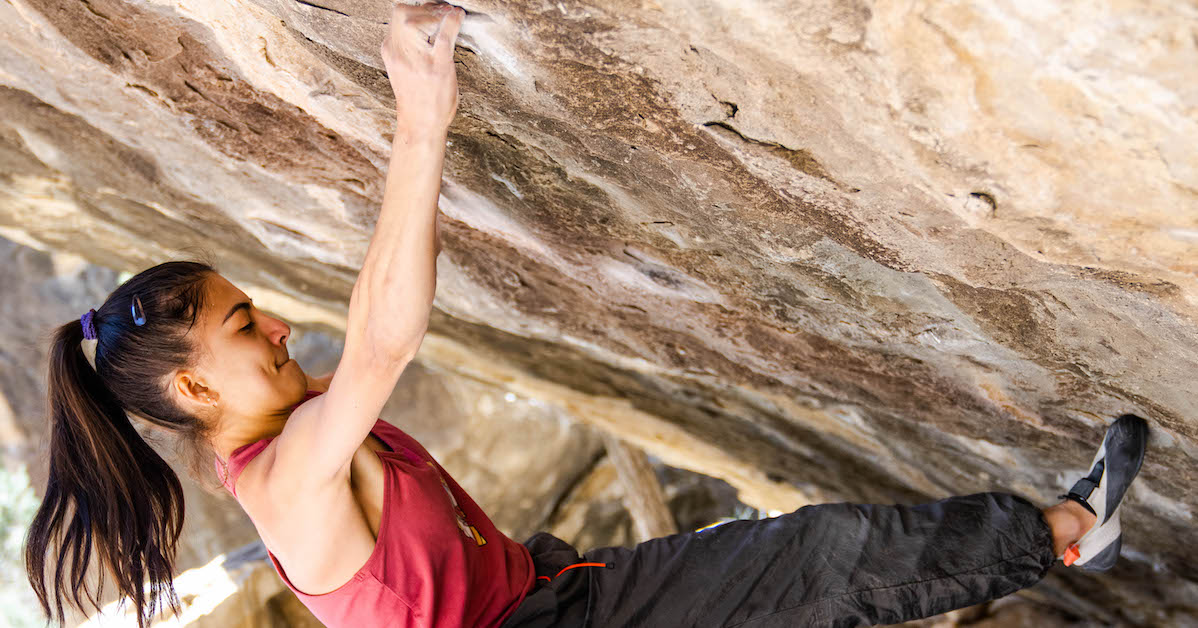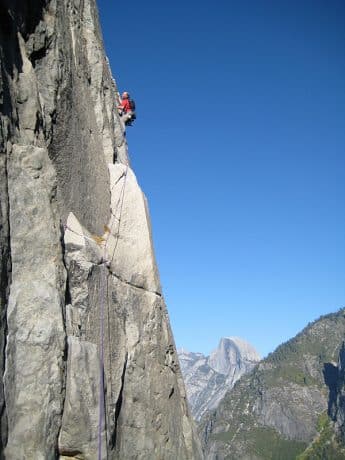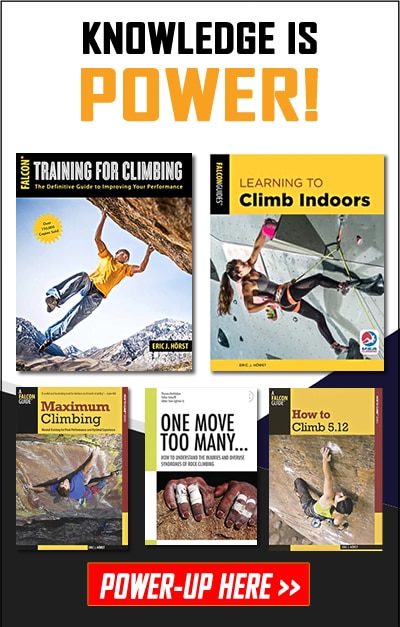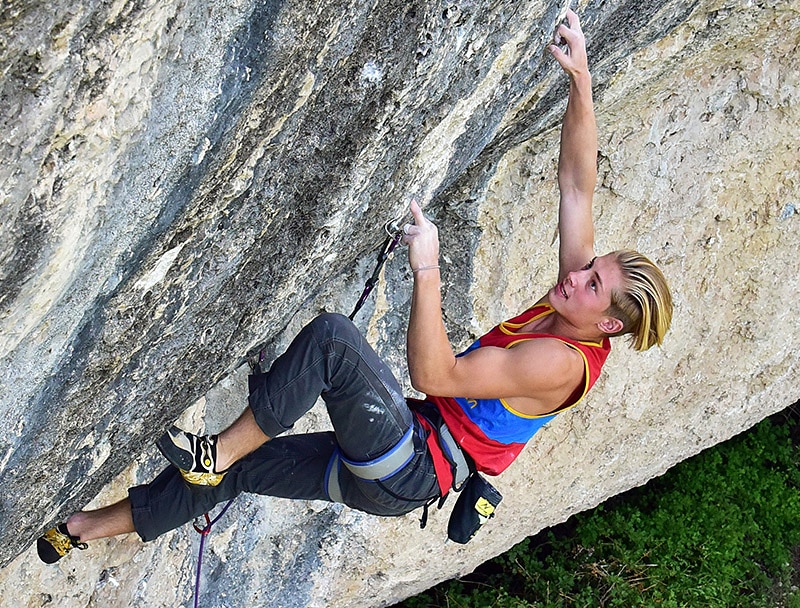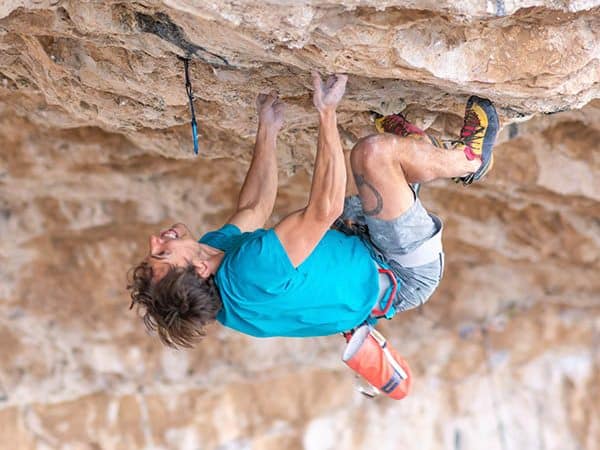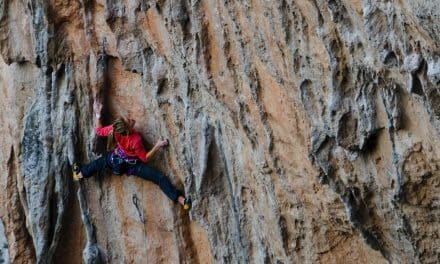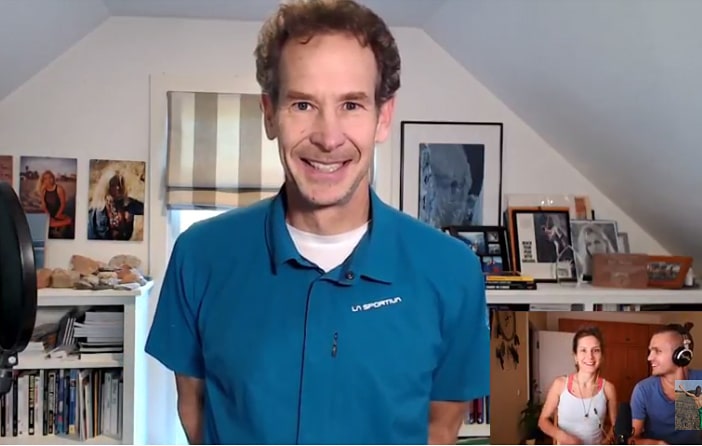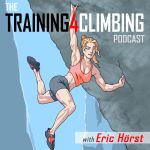There’s more to climbing than physical prowess. Success ultimately comes down to two mental strengths that can more than make up for differences in ability. Learn how to practice self-discipline and commitment on the wall to stretch your physical skills further.
(This article was originally published in March of 2018).
It takes great discipline to boulder V12, climb 5.14, win a world cup competition, summit a daunting mountain peak, and do other difficult things. In fact, regardless of the grade you aspire to climb, it will take great discipline to reach any mega goal and maximize your climbing experience. So, what exactly is self-discipline? And how can you strengthen it?
Self-discipline is the ability to act with steady, conscious control for the sake of directing or changing behavior, divesting from things of lesser value, and delaying gratification, all in the pursuit of a higher purpose or goal. In climbing, it takes self-discipline to train optimally (neither overtraining nor undertraining), to consume a healthy diet, and to maintain a calm, controlled demeanor under stressful circumstances. Climbers also practice self-discipline when choosing to abstain from things (foods, activities, and other extravagant pleasures) that will diminish personal effectiveness and squander precious time and energy. In all of the above examples, self-discipline requires willpower.
As detailed in my “X-factors” podcast, willpower is a human endowment that develops through regular use. By actively asserting a little more self-discipline each day—saying “no” to things that conflict with your goals, and taking the necessary actions to advance toward those goals—you will not only grow greater self-discipline, but also increase forward momentum, develop more self-confidence, and feel the unique pleasure of total commitment to a goal.
One of the beauties of self-discipline is that it’s a powerful compensatory tool. Think of it as a lever that multiplies your current technical and physical capabilities. In developing greater self-discipline, you lengthen the lever! Fascinating research from the University of Pennsylvania shows that self-discipline is a better predictor of academic success than IQ. And while they did not study athletic pursuits, I feel that self-discipline is a similarly strong predictor of athletic success. Thus, although ideal genetics don’t guarantee that you will achieve climbing greatness, a lack of self-discipline does guarantee something: mediocrity. Strong self-discipline can make up for what you might be lacking in resources, experience, or genetic talent. Self-discipline, then, is the great equalizer!
Think of self-discipline as a lever that multiplies your current technical and physical capabilities—and in developing greater self-discipline, you lengthen the lever!
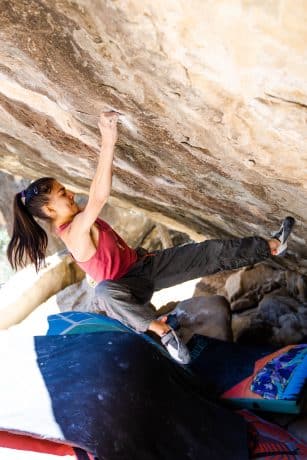
Comfort on highly precise moves comes from both strength and dedicated practice! Photo courtesy: Natalia Grossman
Possessing Healthy Commitment
So what counts as a healthy level of commitment? Given my energetic and highly focused approach to all things training and climbing, you might be thinking that Eric’s kind of intense or Eric’s instruction is a little over the top. Yes, I’ve heard this before, but I take it as a compliment; better to be too focused, too analytical, and too disciplined, than to be scatterbrained and lazy. But I digress.
Let me now state clearly that there is such a thing as being overcommitted and going overboard in the pursuit of your goals. While self-discipline, perseverance, and commitment are all necessary to achieve uncommon success and maximum experience, it is healthy and in fact beneficial to occasionally take some time off and break from the ways of strict self-discipline. Taking one day off per week, one weekend off per month, and even a few weeks off per year is essential to refresh your mind, rest your body, and prevent burnout. This is a practice utilized by many of the best climbers, past and present; Caldwell, Sharma, Hill, Güllich, Skinner, and many others, have been known to take time away from climbing after a long season or upon achieving a major goal. You should, too.
Healthy Commitment
If climbing is really important to you, then you owe it to yourself to assume a healthy level of commitment. This is the amount that will energize you in the short term, and keep you engaged and motivated for years to come. Below I present three markedly different levels of commitment, including what I feel is a healthy level of commitment. Which describes your current commitment level?
- Low commitment is exemplified by the dreamer who takes little meaningful action toward a goal, follows a path of low resistance, and rarely challenges himself. In climbing, low commitment is seen in the person who, despite setting goals, trains haphazardly, climbs infrequently, rarely pushes himself to the point of falling, and fails to persevere in times of adversity.
- Healthy commitment is evident in the passionate person who has a mega goal, a plan of action for achieving it, and a record of taking daily steps toward the goal while maintaining a sense of balance in his/her life. A climber with a healthy level of commitment trains and climbs optimally (rather than obsessively), exercises self-discipline in determining use of time and in avoiding distractions (people, places, and situations), sacrifices things that will conflict with important goals, and balances his/her climbing life with other high-value nonclimbing life activities. Healthy commitment is about having a serious dedication to climbing, but not an obsessive devotion that dismisses all other things in life as unimportant.
- Unhealthy commitment is marked by obsessive thought and pursuit of an activity or goal at the expense of all other things, including one’s physical and mental well-being. Unhealthy commitment to climbing is exemplified by the person who climbs and trains every day or to the point of chronic injury. It is also evident in those who destroy important relationships or sabotage other important life areas in the name of reaching their goals. While climbers with unhealthy commitment may experience significant success for a period of time, they will ultimately end up injured, depressed, and burned out, and hence they are unlikely to reach their big, long-term goals.
Related Articles:
- Healthy Commitment to Improving Your Climbing
- 5 Strategies to Sharpen Your Concentration and Climb Better!
- 10 Tips for Pursuing Maximum Climbing Performance
- Overcoming the Fear of Failure
- Success Strategies for Peak Performance
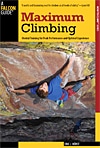
Achieving the next grade or doing the ‘impossible’ is a battle fought more in the mind than in the body.
In Maximum Climbing, Eric Hörst presents a climber’s guide to the software of the brain—one that will prove invaluable whether your preference is bouldering, sport climbing, traditional climbing, or mountaineering. Maximum Climbing is thus a content-rich text with enormous information flow, and it has the astonishing potential to change and serve you in new ways as you change in the years to come. Eric brings unprecedented clarity to the many cognitive and neurophysical aspects of climbing and dovetails this information into a complete program. By learning and steadfastly applying these techniques, you will come to perform and achieve—in climbing and beyond—at a level that you can hardly imagine today! Learn more about Maximum Climbing >>
Copyright © 2000-2023 Eric J. Hörst | All Rights Reserved.

